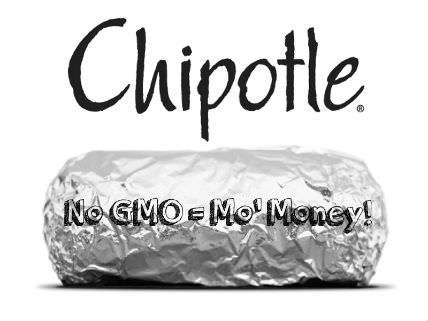Chipotle Feeds Anti-Scientific Derangement Syndrome, Says WaPo Columnist
Voluntary GMO labeling will express religious views and strictures much like halal and kosher labels do now.

Last week, I explained in my column, By Feeding Bogus GMO Fears, Chipotle Treats Customers Like Idiots, that while the company is certainly free to sell whatever it believes its customers want, the taco-peddling corporation is violating its own pledge to sell "food with integrity."
In today's Washington Post, columnist Michael Gerson makes some salient points about the responsibility of corporations not to propagandize pseudoscience:
This milestone in the history of fast-food scruples (and of advertising) is also a noteworthy cultural development: the systematic incorporation of anti-scientific attitudes into corporate branding strategies. There is no credible evidence that ingesting a plant that has been swiftly genetically modified in a lab has a different health outcome than ingesting a plant that has been slowly genetically modified through selective breeding. The National Academy of Sciences, the American Medical Association, the American Association for the Advancement of Science and the World Health Organization have concluded that GMOs are safe to eat. …
Yet Whole Foods promises "full GMO transparency" by 2018. Its Web site emphasizes "your right to know." But you will search the site in vain for any explanation of how or why GMOs are harmful, because an actual assertion would not withstand scrutiny. Evidently your right to know does not include serious scientific arguments. Chipotle co-chief executive Steve Ells set out his rationale this way: "They say these ingredients are safe, but I think we all know we'd rather have food that doesn't contain them." …
But Chipotle, Whole Foods and those who follow their examples are doing real social harm. They are polluting public discourse on scientific matters. They are legitimizing an approach to science that elevates Internet medical diagnosis, social media technological consensus and discredited studies in obscure journals. They are contributing to a political atmosphere in which people pick their scientific views to fit their ideologies, predispositions and obsessions. And they are undermining public trust in legitimate scientific authority, which undermines the possibility of rational public policy on a range of issues.
Whatever the intention of those involved, embracing pseudoscience as the centerpiece of an advertising and branding effort is an act of corporate irresponsibility.
Yes.
Although Whole Foods' "GMO transparency" effort also kowtows to pseudoscience, it is somewhat less objectionable because vendors using ingredients from biotech crops are still free to offer their products in Whole Foods stores. Keep in mind that Whole Foods still sells quack homeopathic (quack is a bit redundant here) remedies as well.
In any case, both the FDA and the USDA are developing non-disparaging voluntary labeling guidelines. Voluntary GMO labeling will express essentially religious views and strictures much like halal and kosher labels do now.


Show Comments (75)